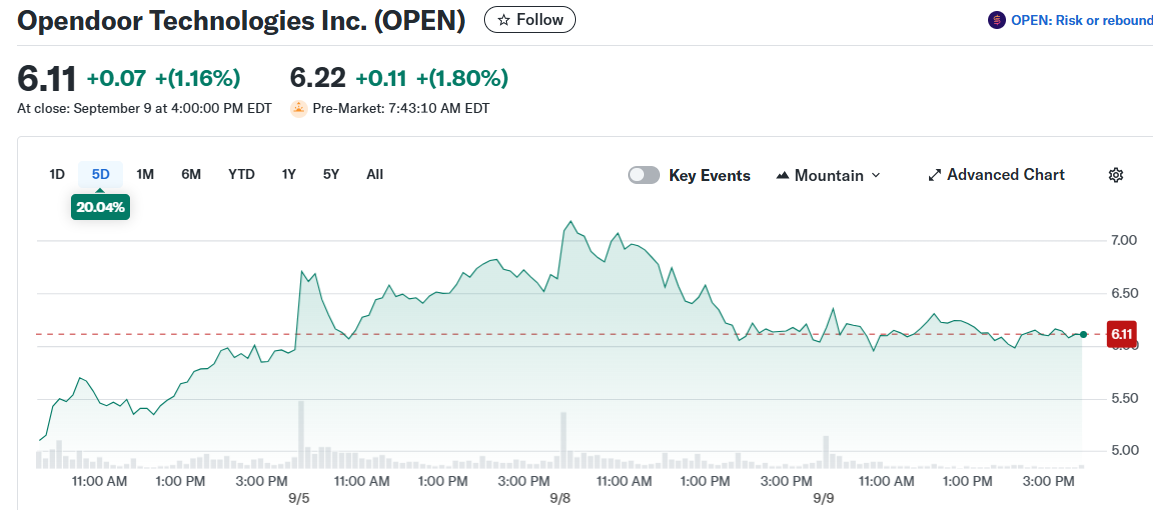TLDR
- Opendoor appointed Shrisha Radhakrishna as interim CEO, planning AI implementation across operations
- Stock surged 300% from 2025 lows but remains 80% below all-time highs
- Company narrowed first-half losses to $114 million while achieving positive adjusted EBITDA in Q2
- Third-quarter revenue expected to decline 38-43% due to elevated mortgage rates
- Analysts forecast revenue growth returning in 2026-2027 as housing market recovers
Opendoor Technologies has experienced one of the most volatile trading patterns in recent memory. After crashing to just 51 cents in June 2025, shares have rocketed over 300% higher to current levels around $6.11.

The dramatic recovery comes as new leadership takes control of the struggling iBuying platform. Shrisha Radhakrishna stepped in as interim CEO last month following Carrie Wheeler’s departure.
Radhakrishna believes artificial intelligence holds the key to transforming Opendoor’s operations. The new leader plans to expand AI usage beyond current pricing algorithms into marketing and home assessment processes.
However, AI implementation requires investment that cash-strapped Opendoor can barely afford. The company carries over $2 billion in debt while posting consistent losses quarter after quarter.
Financial Performance Shows Mixed Signals
Recent financial results paint a complicated picture for investors. Opendoor narrowed its first-half net loss to $114 million compared to $201 million in the prior year period.
Revenue grew modestly by 1% to $2.7 billion during the same timeframe. More encouraging was the company’s first positive adjusted EBITDA margin achieved in the second quarter.
These improvements came through aggressive cost-cutting measures. Opendoor reduced its workforce, streamlined operations, and negotiated lower transaction costs with partners.
Third-quarter guidance disappointed Wall Street expectations. Management projects revenue will drop 38-43% year-over-year as the housing market remains challenging.
Housing Market Headwinds Persist
Elevated mortgage rates continue hampering home sales nationwide. Despite Federal Reserve rate cuts, borrowing costs remain stubbornly high for most buyers.
Opendoor scaled back home purchases by 63% in the second quarter to avoid inventory buildups. The company learned from previous mistakes when it got stuck holding depreciating properties.
Management expects market conditions to remain difficult through the remainder of 2025. Affordability issues keep potential buyers on the sidelines while sellers withdraw listings.
The company has adapted by expanding partnerships with builders and real estate agents. These capital-light arrangements generate commission income without requiring property purchases.
Opendoor also launched Exclusives, a platform directly matching sellers with buyers. This model reduces inventory risk while creating higher-margin revenue streams.
Analysts project revenue will decline 20% to $4.1 billion for the full year. However, they expect growth to resume in 2026 with 6% expansion followed by 16% growth in 2027.
Wall Street forecasts adjusted EBITDA turning positive in 2027 as market conditions normalize. If achieved, this would mark a major milestone for the loss-making company.
Last quarter’s interest expense totaled $36 million, nearly triple the $13 million operating loss, highlighting the debt burden’s impact on profitability.





